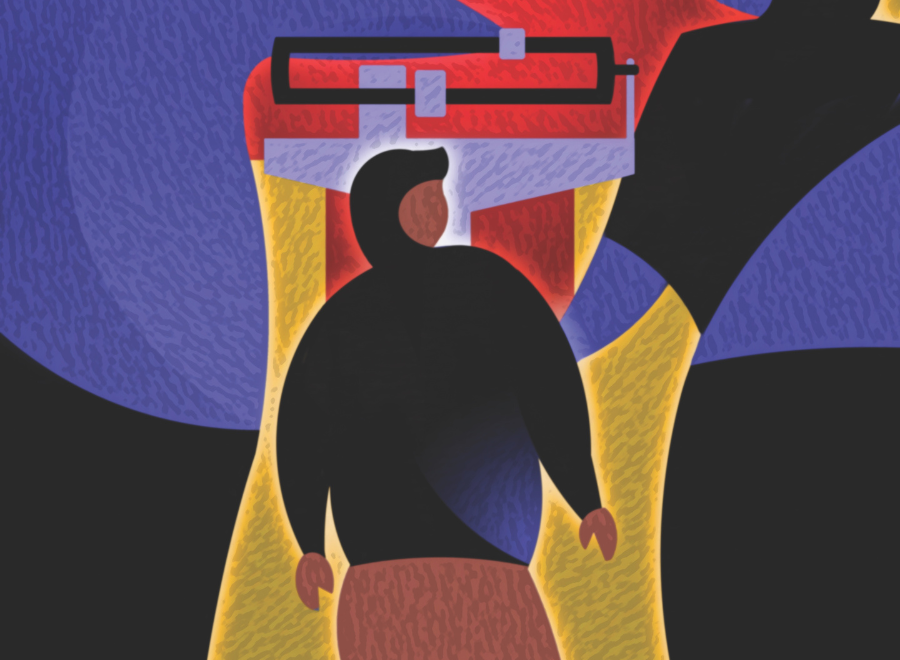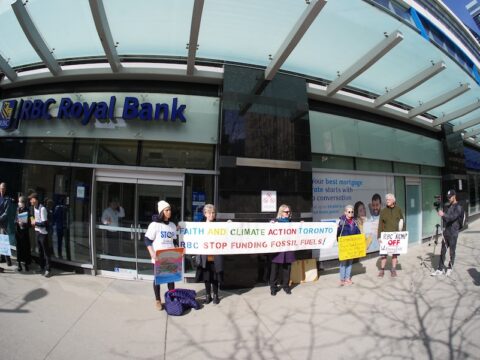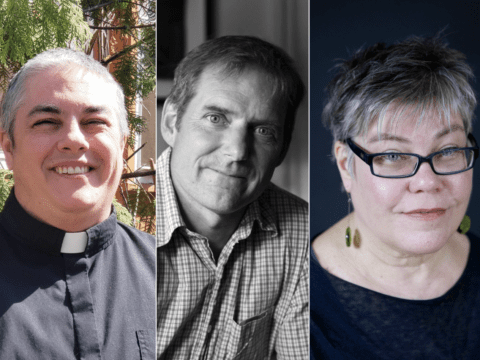As Dolly Parton is to country music, so Gwen Shamblin is to faith-based weight-loss programs. With sky-high teased blond hair, a Miss America figure and a kittenish southern belle accent, the grandmother of six is also the world’s foremost authority on enlisting Jesus in the fight against fat.
The Weigh Down Diet, a program she started 30 years ago in her hometown of Memphis, Tenn., has helped thousands all over the world lose weight — and lots of it. There’s her own story, of course. She’s a former cheerleader who started to put on belly weight at university, when she was studying for her master’s degree in nutrition. Regular diets didn’t work for her. It wasn’t until she prayed about it, fervently, asking God to fill her heart, that she began to drop weight permanently.
You may unsubscribe from any of our newsletters at any time.
“God created two empty holes in all of us,” Shamblin says in a phone interview from her Truthstream ministry headquarters near Nashville. “There’s the stomach, which is never empty in America. And there’s the empty heart. God created it to be empty so we’d reach out to Him.”
North Americans are fat, Shamblin posits, because they confuse the two. Instead of reaching out to God, people are trying to fill their empty hearts with potato chips. The Weigh Down diet instructs weight-loss hopefuls to pray, not binge.
Shamblin isn’t alone in her analysis. Christian diets are published by the dozens, often with cutesy monikers: Bod 4 God; Made to Crave; Help Lord — The Devil Wants Me Fat!; Take Back Your Temple; More of Jesus, Less of Me; From Fat to Faith. All of them sell essentially the same message: fat is a spiritual problem because God wants you healthy.
For progressive Christians, such books and their shiny slogans may be less than convincing. But criticism is easy. Faithfully engaging with the unique historical fact that more than half of Canadian adults are now overweight or obese, according to Statistics Canada, is not. So far, mainline churches have been slow to take up the issue. Some leaders have addressed overconsumption generally, and the ethics of the intensive farming and fishing practices that create the potential for obesity: plenty of cheap calories. But the problem of individual eating habits is largely left to evangelical and fundamentalist diet gurus like Shamblin.
Given the growing obesity crisis in North America and its possible spiritual roots, how long will liberal churches be content to keep quiet?
The first time United Church minister Rev. Sue Breisch went to Weight Watchers, she was nine years old. Her parents took her, concerned that their formerly normal-weight daughter was packing on the pounds. What they didn’t know is that Breisch had been abused the year before, outside the home. It was her secret, and she was covering the experience with food.
Now 48, a mother of teens and working a two-point charge in Nova Scotia, Breisch is still fighting obesity, as she has since she was a child. She’s been on every diet (though never a “Christian diet”). They don’t work, she says, because they focus on “what you’re eating, rather than what’s eating you.” When she sees fat people, she doesn’t see a so-called obesity epidemic. Echoing Shamblin, she sees the physical manifestation of two common 21st-century black holes: emotional pain and spiritual emptiness.
“When I was abused, I decided that bad things happen to bad people,” she says. “That I was bad. That I didn’t deserve good things. So I gave up on myself at eight years old — but I didn’t know I had, until 40 years later.”
The answer to the fight against fat, Breisch believes, could lie within the church. And that’s because fat is not what needs to be fought. Fat, she is quick to distinguish, is not sin; often, fat is a symptom of a “spiritual sickness,” individually and culturally. Church is where we’re bound together in our brokenness, she says. It’s where we find the spiritual tools to address our emptiness and reach out to God.
If fat is a spiritual issue, growing every year, why is the liberal church so silent about it? “We’re too busy being nice,” Breisch says. “At church, we put on our game face. So we often miss the hurts that are in people’s hearts. We kind of want to pat recovering people on the heads, but we’re not sure if we want their mess in the midst of us. . . . We’re busy having an idea about God, rather than an experience of God.”
Breisch and Shamblin’s argument that fat is a spiritual problem is radically different from mainstream analysis. The common secular theory for North American obesity, espoused in books such as Fast Food Nation: The Dark Side of the All-American Meal, posits that the pudge comes from a never-before-imagined abundance of food. In a single day, on an average Canadian income, it’s possible to eat bacon and eggs, a medium box of Timbits and a double-double, a shrimp sandwich with fries, a latte, a full steak dinner with a buttery baked potato, a couple of beers, and a bag of chips and a Coke in front of the TV.
Mainline Christian churches have been slow to respond to the abundance. As David Grumett points out in his recent book Theology on the Menu: Asceticism, Meat and Christian Diet, the early Christians were easily identified by the foods they ate; diet was a central part of their spiritual practice. He notes that today’s mainline Christian leaders rarely discuss diet, which is a profound departure from tradition.
Not all denominations have abandoned diet as spiritual practice. Since the 1970s, researchers have studied the effects of the Seventh-Day Adventists’ diet on adherents. Based on their interpretation of the Bible, SDAs do not eat meat, they avoid alcohol, caffeine and other stimulants, and they heed the body’s “full” signals — a practice in moderation. The results show they’re the longest-lived Americans (outpacing the general population by nearly a decade), with far lower rates of heart disease, diabetes and cancer — not to mention obesity.
Of course, the norm for Christians is just the opposite. In 2011, Northwestern University found that church-attending young adults are 50 percent more likely to become obese by middle age than their non-religious peers. “We don’t know why,” said the study’s author, Matthew Feinstein. At Purdue University, Ken Ferraro has been studying the relationship between fat and faith for more than 20 years. “Most religions . . . encourage restraint from participating in injurious behaviors, such as heavy drinking and smoking,” he noted in 2006, after his research showed that certain religious activities tend to be linked with obesity. “However, overeating is not considered a great sin — it has become the accepted vice.”
Since these findings, American churches have felt pressure to address obesity in the pews. In October, the Christian Century reposted a piece by evangelical blogger Shane Blackshear, who asked the church to speak out against gluttony. “The last thing we need is to turn the church into vain snobs. . . . But, when we ignore the problem, decide not to be our brother’s/sister’s keeper, we stand by while people kill themselves slowly, and it will be yet another facet of life in which we are no different than the world around us. We’ve got to open our eyes and see that this obesity epidemic is the church’s problem.”
When he looks at Christian dieting websites such as Shamblin’s Weighdown.com, Rev. James Christie says his “nostrils start to twitch.” Christie, a professor of religion and global policy at the University of Winnipeg, thinks Christian diets “smell like snake oil,” a clearly secular commercial endeavour in the saleable guise of godliness.
“Obesity is not a Christian issue. It just isn’t,” he says, noting that an overabundance of food is a 21st-century challenge, and one the Bible is silent on. It’s a cultural issue, he adds, and the Bible has no specific wisdom for fighting this secular epidemic. In fact, Christie notes that Jesus was criticized for being a “glutton and a winebibber” and seemed to “enjoy a good piss-up as anyone else.” The Kingdom of God, he says, is described as “a great feast.”
“We are so concerned with taking pounds off, but our concern should be to feed those who do not have food,” he says.
Still, while Christie does not struggle with his weight, he says his heart goes out to those who do, and for the spiritual hurts that underlie their “chronic illness.” The United Church, in its rush to collective action, “has forgotten to address the heartaches of individuals. We’re wrestling with what it means to deal with individual faith.”
Shamblin, of course, is all about individual faith. She says she’s “more in love with God than the average person,” and her diet program encourages followers to foster a personal relationship to God. Faulted for being superficial, she has referred to herself as a “dumb blond,” someone who’s beneath and beyond the criticism progressive Christians and secular academics aim at Weigh Down.
But she says she earnestly believes, in her heart, she’s stumbled upon something profound — the cure to North America’s spiritual malaise, one prayer and one abandoned doughnut at a time.
To Breisch, the church has a pivotal place in healing her weight and the pain beneath it. She’s recognized that food addiction blocks her spiritual path, so she’s working through it, losing weight along the way, though “not svelte yet.” However, she cautions the church against singling out fatness and engaging with any kind of anti-obesity statement or plan, which tends to further stigmatize people living with extra weight. Instead, she urges churches to focus on feeding spiritual hunger and shining light on our universal brokenness.
On a practical, individual basis, though, she’s enlisted her congregation with helping her resist food. As a minister, she’s surrounded by goodies. One member recently brought out a tray of brownies at a meeting but thoughtfully handed Breisch a low-fat cheese string instead.
“I’m just honest about [the struggle],” Breisch says. “People are already asking me what they can do to support me in this. That’s what happens when we tell the truth.”
***
This story first appeared in The United Church Observer’s January 2013 issue with the title “Full stomachs, empty souls.”













